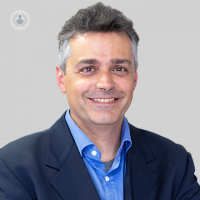How cardiovascular screening of young athletes can save lives
Written by:Every week in the UK, 12 children or young adults die suddenly while they are undertaking sports activities. These children die due to undiagnosed electrical or structural heart abnormalities, which can be easily identified by non-invasive testing.
Dr Alessandro Giardini, one of our top cardiologist based at Great Ormond Street Hospital in London, tell us more about sudden death among young athletes and why screening is so important to help prevent it.

Why is cardiovascular screening in athletes done?
Sports participation is very important for the emotional and physical development of children and adults alike. We know that people who exercise regularly have lower blood pressure and cholesterol and better control of diabetes. Furthermore, exercise generally has a positive effect on people’s long-term outlook.
However, a small number of people can be born with congenital abnormalities or electrical problems with the heart, and exposure to especially competitive sports can cause serious health problems, and in some cases, death in these people. The role of screening competitive sports participants is therefore carried out to identify these people who are at a higher risk.
What type of diseases are competitive sports players at risk of?
There are three main large groups of heart conditions:
- The first group comprises of people who have been born with heart abnormalities that can affect, for example, the heart valves, the holes in the heart or the way the blood supplies the heart.
- The second large group is made of people that have heart muscle conditions which are largely inherited from their family members.
- The third group comprises of people with electrical heart abnormalities, or heart arrhythmias, which occur when the electrical impulses that coordinate your heartbeats don't work properly.
For all of these conditions, regular competitive sport can lead to problems, including a drop in blood pressure or problems in the rhythm of the heartbeat that can sometimes be lethal.
What type of cardiovascular tests are used?
The majority of people that undertake competitive sport don't need to undertake very extensive testing. A good family history, a thorough examination and an electrocardiogram (ECG) are usually able to identify cardiac problems in these individuals.
In a small minority of people, however, there might be the need for further investigations which is typically an echocardiography. This involves an ultrasound investigation of the heart, which is a non-invasive and non-painful way of assessing the heart’s structure and function. If any abnormal results are flagged from any of these investigations during the echocardiogram, then further testing might be required - but this only occurs in a very limited number of subjects.
Who should be getting screened and how often?
Every child and young adult who undertakes competitive sports should be screened, particularly if they have symptoms such as chest pain, feeling the heart racing excessively during exercise or getting out of breath or fainting while they're engaging in sport.
How can cardiovascular screening save lives?
Every week in the UK, 12 children or young adults with abnormalities in the heart die suddenly and these children die because they have undiagnosed abnormalities can be easily identified by non-invasive testing.
Screening people that take part in competitive sports can identify everyone that is at a high risk of dying suddenly or having major problems while doing exercise. It is very important that everyone undertaking any type of competitive sport - particularly if they have symptoms - gets screened.
Where can young athletes get screened?
Younger athletes can be screened if they have symptoms in their local hospitals under the NHS. In some cases, if their sport is at a very high level or they play professionally, then this will usually be organised by their teams or the club they play for. Otherwise, there are many facilities and organisations where these investigations can be undertaken throughout the country.
CRY (Cardiac Risk in the Young) is an organisation that offers subsidised ECG and echocardiogram screening to all young people between the ages of 14 and 35. Visit their website to find out more.
If you are worried about your heart or you are experiencing any symptoms that concern you, visit Dr Alessandro Giardini's Top Doctors profile and book an appointment with him.


